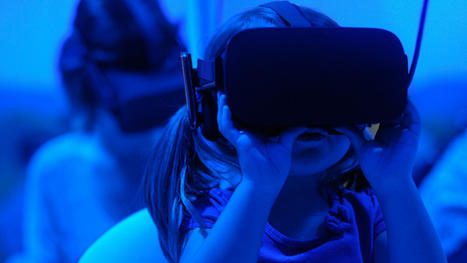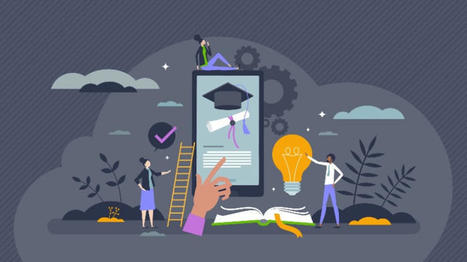 Your new post is loading...
 Your new post is loading...
Aprende a crear presentaciones interactivas y animadas con Genially. Descubre cómo comunicar y transmitir información de forma atractiva.
What are microcredentials and why can they elevate your career despite the fast pace of the modern job market?
Via EDTECH@UTRGV
Designed by Humans for Humans. This book and its companion courses are the fruits of a passionate team with over half a century of combined expertise in teaching, training, research, and curriculum development. As dedicated frontline educators, our team fervently champions human-centered developmental approaches, such as design thinking, which emphasize deep empathy to guarantee that every outcome remains human-focused.
Via Edumorfosis
Vivimos en un mundo cada vez más digitalizado, donde la tecnología juega un papel más y más relevante en todos los ámbitos, incluido el educativo. En este contexto, tenemos la satisfacción de presentar un libro generado de forma colaborativa sobre la inteligencia artificial en la microeducación, publicado por el ODITE (Observatorio de Innovación Educativa y Cultura Digital) de la Asociación Espiral, Educación y Tecnología. Este libro es el resultado de un año de trabajo de docentes de todas las áreas y niveles educativos y especialistas de seis países diferentes que nos adentra en los fundamentos de la IA y su aplicación en el ámbito educativo más cercano: el trabajo en el aula.
El propósito de ODITE es que este libro sea una obra de referencia para todos aquellos docentes, educadores y educadoras, expertos y profesionales de la educación interesados en comprender y aprovechar las oportunidades que la IA puede aportar al aula, siempre desde un enfoque crítico, ético e inclusivo.
La obra se estructura en tres grandes bloques en los que se plantean conceptos básicos como la IA, hasta reflexiones éticas sobre su integración en las dinámicas de evaluación. El libro aborda de forma exhaustiva los principales aspectos a tener en cuenta si queremos incorporar la inteligencia artificial como herramienta relevante a nuestra labor docente.
Via Edumorfosis
Javier Recuenco (@Recuenco) y Juan Freire (@jfreire) no necesitan presentación, si quieres saber más sobre ellos te recomiendo que escuches el episodio 27 de Intercambio Iónico con Juan Freire sobre educación y los episodios 7 y 14 con Javier Recuenco sobre dos libros míticos, “Cómo perder en casi todo y aún así triunfar” de Scott Adams y “Pensar rápido, pensar despacio” de Daniel Kahneman. En este episodio descomponemos las funciones de la universidad para analizarla en detalle primero y después pensar juntos como arreglarla o directamente sustituirla con otras iniciativas.
Via Edumorfosis
Data literacy skills are increasingly important in the modern workplace. Ermal Haranlli, Nedelin Velikov and Kehara Warnakulasuriya offer their advice on readying your students for the future
Via Vladimir Kukharenko
Tracking teaching, grades and research productivity with electronic systems is affecting staff independence and well-being, union-backed survey finds
Via Vladimir Kukharenko
Email Reminder for all those bookmarks you'll never read. Save your Bookmarks on Bookmarkish and receive one email every Sunday with 2 Bookmarks for you to revisit.
Via Nik Peachey
Educators are slowly experimenting with AI tools in a variety of ways, according to EdWeek Research Center survey data.
Via EDTECH@UTRGV
Using the voice capabilities in ChatGPT to enrich interactive learning experiences could signal a new era in education and course design.
Via EDTECH@UTRGV
EdTech has been a hot button topic for some time now, and the focus on Generative AI in 2023 has only amplified interest in EdTech. Proponents see a plethora of ways that AI can improve education outcomes. AI’s potential for transforming education is real, but so are the dangers—so we must move forward with care and intentionality. It is with an eye toward care and intentionality that members of W2050’s Senior Fellows committee on education and work met to discuss how AI could—and how it should—impact education in 2024 and beyond.
Via Canadian Vocational Association / Association canadienne de la formation professionnelle, juandoming, Edumorfosis
Despite the immense potential of increasingly sophisticated Artificial Intelligence (AI) to boost performance, efficiency, growth, and customer experiences, not all organizations are ready to enjoy AI’s benefits.
In sectors such as healthcare, pharma, biotech, manufacturing, and finance, some organizations struggle to build the powerful, unified infrastructure they need to manage AI’s steep processing, data, and security demands of applying reliable large language models (LLMs). Most also lack the necessary expertise to build AI-driven strategy and keep pace with compliance changes.
Via Edumorfosis
By immersing yourself in a VR simulation of your upcoming meeting or event, you are able to practice within a scenario that is not only realistic but which also replicates the inevitable nerves and anxiety – making your practice far more stimulating and effective.
Via Nik Peachey
|
Is the PBL at your school happening, but not working?
Dive into how EdTech apps can revolutionize learning by offering personalized, cost-effective programs for students, teachers, and schools.
Via EDTECH@UTRGV
To help learners succeed and provide them with socioeconomic mobility, higher ed must make sure learning opportunities are abundant, personalized and easy to access.
Via EDTECH@UTRGV
Traditional marketing approaches sometimes fall short when it comes to captivating consumers and making a lasting impression on brands.
However, virtual reality (VR) technology has just emerged, providing companies with a potent weapon that may transform their advertising strategies. Startups may make a lasting impact on their target audience by using VR's immersive and interactive nature to create fascinating experiences.
Via Edumorfosis
"Wedding bells ring not just for couples but also for the transformative wave of AI, heralding a new chapter in the timeless tale of matrimony ..."
Via Leona Ungerer
Although Anadolu University is a dual mode higher education institution, it has been acting as an open university since 1982 and offering quality undergraduate education to millions in Turkiye. In 2023-2024 Fall semester, over a million students
Via Vladimir Kukharenko
In a recently announced transaction, 2U will acquire all edX assets, including the brand, about 3,500 digital courses, and the website — with its 50 million learners. This development should serve as a wakeup call for other colleges and universities, which must start thinking about how to unbundle the value chain and outsource areas where others possess superior core competencies By partnering and controlling significant parts of value chain instead of resisting them, universities can gain a significant portion of revenues that would steadily migrate toward EdTech companies. Those additional revenues can provide seed capital to universities to drive their own EdTech initiatives. Right now, they’re mere spectators in the game.
Via Peter Mellow
Generative AI doesn’t exist in a vacuum. The rapid advancements we’ve seen in generative AI over the past year or so have been made possible by other tech breakthroughs. Cloud computing, for example, democratizes access to AI technologies. 5G amplifies the potential of generative AI by facilitating real-time analytics and AI processing. And the Internet of Things provides a rich source of data for generative AI models to mine.
Via Edumorfosis
Every time we enjoy the arrival of new technology, hackers always lie in wait to use this tech to prey on lagging defenses or users who are still learning the ropes.
Via EDTECH@UTRGV
The world of work is in full metamorphosis, forever changed by the seismic shifts of the past few years and accelerated by the imminent human-machine teaming revolution. Just as organizations were settling into a new normal – with a focus on hybrid working, comprehensive health and well-being, digitalization, and upskilling – Generative AI (Gen AI) burst onto the scene. Changing not only how people work but the work experience itself, Gen AI has been met with equal measures of unease and excitement. Will it produce a real productivity lift? Can the increased risk exposure be effectively managed, and is it worth it? What will be the permanent impact on the competitive landscape? These are the conversations dominating boardrooms and team chats, with one universal truth emerging: Unlocking the potential of this new world of work means keeping people at the heart of the transformation agenda. There is no escaping the need for new ways of working and new ways to value workers. The societal dynamics emanating from the last few years (including louder calls for fair pay, better working conditions, and less environmental impact) are aggressively reshaping the work contract. Leading companies are rethinking their People practices and leveraging greater talent science to ensure a more sustainable, equitable and intuitive work experience. The urgency is coming from all stakeholders. Two in five workers believe that the world of work is fundamentally broken and one in four wish they didn’t have to work at all. People crave the peace of mind that comes with job security and financial well-being – staples that become increasingly important during times of upheaval. Executives are also seeking solid ground, focused on keeping their business running by addressing inflation, digital acceleration, and alternative work models. Climate concerns are hitting closer to home as more frequent extreme weather events impact business continuity. Cyber risk has been bumped from its top spot in 2022, and significantly fewer executives are accounting for an overall heightened risk environment in their plans. HR remains anxious about rising labor costs, managing a remote workforce, and skills shortages. And 89% of asset managers see an engaged workforce as a key driver of company value.
Via Edumorfosis
Creating the University of the Future—A Global View on Future Skills and Future Higher Education is a book about the role of higher education institutions in a world which is changing faster than ever before. Never has it been more urgent to actively shape the global transformation we are facing in order to create the best possible future, and never has there been a greater imperative for
students to learn the necessary skills—Future Skills—for this. Their promotion is currently one of the most debated challenges for higher education institutions all over the world.
This book presents visionary higher and tertiary education programs aiming at Future Skills for their graduates. It compiles contributions from more than 50 authors who are engaged in global intergovernmental organizations such as UNESCO and OECD involved in research and policy-making as well as from higher and tertiary education institutions from different countries and continents.
With the challenges ahead, the book calls for the “Future Skills Turn” on a global level to become reality and demands for rethinking our current educational systems and realities. This volume aims at increasing visibility for existing and emerging innovative teaching and learning practices for educational professionals, while informing educational leaders about the newest Future Skills strategies, and inspiring all educational stakeholders on their journey towards future-ready higher education.
Via Canadian Vocational Association / Association canadienne de la formation professionnelle, juandoming, Edumorfosis
Micro-credentials have recently been high on the agendas of various higher education stakeholders across the world. An increasing number of universities now offer them in addition to their regular macro degrees. Policy-making bodies have begun to update their national university admission systems to recognize micro-credentials.
Via Edumorfosis
|







 Your new post is loading...
Your new post is loading...



![[PDF] Generation AI: Human-Centered Prompts for the Modern Educator | Education 2.0 & 3.0 | Scoop.it](https://img.scoop.it/rCFjGoW7IFyT4uz2IpcvdTl72eJkfbmt4t8yenImKBVvK0kTmF0xjctABnaLJIm9)
![[eBook] IA en la Microeducación: Transformando el Aula del Futuro | Education 2.0 & 3.0 | Scoop.it](https://img.scoop.it/SPnnm847UX5h90xxjBiPETl72eJkfbmt4t8yenImKBVvK0kTmF0xjctABnaLJIm9)
![[Podcast] La gran CRISIS de la Universidad (Juan Freire & Javier Recuenco) | Education 2.0 & 3.0 | Scoop.it](https://img.scoop.it/BUuybx2eggK9TNtzxpbyijl72eJkfbmt4t8yenImKBVvK0kTmF0xjctABnaLJIm9)
















![[PDF] Global Talent Trends Report 2024 | Education 2.0 & 3.0 | Scoop.it](https://img.scoop.it/Qw21Eytry5efPB48U9iZIDl72eJkfbmt4t8yenImKBVvK0kTmF0xjctABnaLJIm9)
![[eBook] Creating the University of the future: A global view on future skills and future Higher Education | Education 2.0 & 3.0 | Scoop.it](https://img.scoop.it/vLg-e6itll8rs7R3qpoIpzl72eJkfbmt4t8yenImKBVvK0kTmF0xjctABnaLJIm9)






